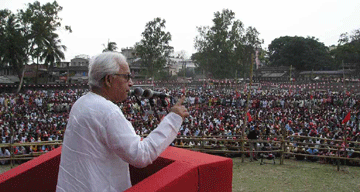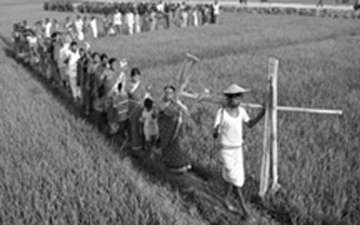 People's Democracy
People's Democracy
(Weekly
Organ of the Communist Party of India (Marxist)
No. 17
April 23, 2006
(Weekly
Organ of the Communist Party of India (Marxist)
|
Vol.
XXX
No. 17 April 23, 2006 |

B Prasant
THE
long awaited, albeit brief, splash of rainfall across Bengal of late has been
accompanied by a serious stepping up of the Left Front’s wide and deep
election campaign across the state. Senior
CPI(M) leaders have fanned out addressing three to four big rallies on a day,
rallies that are sometime several dozens of kilometres apart or more.
These
large rallies are preceded in the area where they are to be held with intense
campaign-propaganda by CPI(M) and Left Front workers.
Processions
are taken out, the political theme of the election campaign spelled out over
loudspeakers all over the locality, and house-to-house approaches are made to
the people urging upon them to come out in large numbers to make the rally a
success.
Audio
cassettes of CPI(M) leaders like Jyoti Basu expounding on the political
significance of the polls are played from both mobile vehicles and from
stationary posts.
The
venue chosen for the rally is usually a large field, sometimes abutting the main
thoroughfares/highways that wind past the townships and villages. In the latter
areas, rural artistes start to play on the big kettle drums and blow on the
horns and trumpets right from early in the afternoon, very often bursting into
mass songs that are always in the dialect of the locality.
The
dais is usually at man-height with deep Red drapery surrounding the
bamboo-and-plank structure with small-stepped staircase adorning the Front and
side of the structure. The backdrop notes the name of the candidates or parties
as the case might be and has emblazoned across it in large and white letters
‘Left Front.’
In
the townships, big as Kolkata and small as, say, Budbud in Burdwan, the pattern
is somewhat different. Here,
the CPI(M) and Left Front workers start gathering early around the venue and
soon slogans and mass songs start to rent the air.
By
the time it is early afternoon, the first of the organised processions would
enter the venue and the people would start squatting down on the vast canvas
sheets that cover the ground. They are a bit lucky for those who would troop in
late it is standing room only at the venue.
With
the afternoon becoming pleasant as the evening breeze picks up and the sun goes
into the westerly summer clouds, the local speakers of the CPI(M) and the Left
Front start addressing the rally, as the ground fills up.
When
the barricades are put to some strain with the assemblage bursting at the seams,
Red scarved Party volunteers step in and cajole the people to be in good humour,
to maintain discipline, and to please cooperate with the rally organisers.
Young
men and women inevitably sporting Red caps and swinging desi
versions of the samovar filled with
boiling black tea soon start circulating among the people and make brisk
business. Cups and glasses of hot
tea is in great demand in Bengal, always, and in all seasons, but apparently
especially so at CPI(M) and LF election rallies.
IMPRESSIVE
TRIBAL DEVELOPMENT
Addressing
one such rally in the red clay district of Bankura at Ranibandh, Biman Basu,
state secretary of the Bengal CPI(M) pointed out that the Maoists had organised
an unholy alliance with the Trinamul Congress, the Pradesh Congress, the BJP and
the Jharkhand Party to try to terrorise the people of some spots of the western
districts of Bengal. The persons of
the Bengal opposition would harp merely on the imaginary theme of
non-development as the ‘reason why’ the terrorists got to operate with
impunity.
Ranibandh,
the speaker stressed, had undergone out-of-sight changes over the past 30 years.
People had starved here under Congress mis-rule and any kind of
developmental infrastructure was conspicuous only by absence. There was no
electricity, no roads, and not even any developed form of agriculture. The
people had been allowed a virtual throw back to revert into hunters and
gatherers.
With the advent in office of the Left Front government, starvation was something that only the corporate media could witness. Rice became available and the extreme low-calorie grass seeds that the people of the area had had with great difficulty survived on. The battle against malnutrition has been won over a period of time.

CPI(M) campaign in the rural areas
In
the misery-filled olden days, Biman Basu said, the tribal people were never
allowed the modicum of dignity human beings are entitled to.
They were treated as serfs and had to survive on the fringe of society
eking out a poverty-ridden living.
In
state after state even now, said the speaker, the tribal people are being
uprooted from land and deprived of their rightful access to forest resources. In
Bengal, 72.5 per cent of the land belonged to the poor, among them tribals. In neighbouring states the immensity of poverty has compelled
tribals to sell even their newborns and their babies. This is something that has never ever happened in Bengal
under the pro-poor rule of the Left Front government.
“For
us,” said Biman Basu, “the electoral struggle is filled with political
contents.” The political
campaign of the CPI(M) and the Left Front go on throughout the year, year after
year, and is nothing that is something esoterically special to the elections
alone.
The
Bengal opposition views the elections as a one-day game and go all out to create
as much counter-democratic fulmination as is possible for them.
The attempt to organise terrorism is one such attempt.
The mass of the people would thwart such ill-gotten efforts through
united resistance. Debalina Hembram is the CPI(M) candidate from Ranibandh.
Speaking
before four large gatherings in Bankura at Ranibandh, Raipur, Indpur, and
Taldangra, Bengal chief minister Buddhadeb Bhattacharjee noted the rejection
that awaited the Bengal opposition in the upcoming elections to the state
assembly. The massive number of
tribals at all the meetings gave the venues the look of a tribal festival with
beating of sonorous drums, playing of reedy flutes, and mass dances.
Bitterly
critical of the Maoists, Buddhadeb chastised the terrorists for taking the name
of Mao Zedong but not bothering to read Mao’s works while going on a killing
spree of poor kisans, khet mazdoors,
and the low-ranking police personnel.
The
principal target of the Maoists is the CPI(M) and the assassins would never
hesitate to cuddle up to the Trinamul Congress and the Congress to gain a bit of
‘bhadralok’ backing for their foulest of deeds.
The
power of the people would defeat the power of the gun was how Buddhadeb would
put it, to rousing roars of approval. In the past the CPI(M) had countered and
pushed into the dustbin of history the Naxalite killers. This time, the Maoists
would finally get isolated and the killing spree would peter out in the face of
people’s power.
Buddhadeb
narrated the developmental work continuing over the past decades in the western
districts of Bengal and he said that the efforts would continue apace.
BUDDHADEB
MEETS THE PRESS
A
one-hour long session that Buddhadeb had on April 12, 2006 with the Kolkata
media at the Press Club has left no one in any doubt about the triumph of the
Left Front in the assembly elections. The
subtext is perhaps the number of seats that the LF will win along with the
margin of victory.
It
was amusing to witness how even the usually hostile and rabidly anti-communist
sections of the media found it necessary to query Buddhadeb about the shape and
size of the cabinet of ministers for the seventh Left Front government.
Principal
highlights of the questions and comments, to both of which Buddhadeb would
respond in a composed manner, would look something like this:
On
the Bengal Opposition
Buddhadeb
corrected the reporters who would critically attribute the possible electoral
triumph of the Left Front because of the political and organisational lacunae of
the Bengal opposition and pointed out that the series of mounting successes of
the pro-people efforts of the LF was the key factor here.
He
also pointed out that a constructive opposition was a pillar of strength in a
democracy but the opposition in Bengal was far from that reality. “We really cannot take it upon ourselves to ensure and
organise electoral successes for the opposition, now, can we?” was
Buddhadeb’s cutting commentary.
The
principal political crime, said the Bengal chief minister, of the Trinamul
Congress was that they had tried to provide political access to the communal BJP
in Bengal. The Congress is in hibernation, and their remaining in that
trance-like sleep-walking state would hardly change things if they had chosen to
suddenly wake up.
The
Left Front and the CPI(M), stressed Buddhadeb, would continue to oppose the
central Congress leadership’s penchant to play junior partner to the US
imperialists.
On
the electoral prospects of the Bengal Left Front
Buddhadeb
said that he did not like to throw around figures but that he was quietly
confident that the seventh Left Front government would be set up post-elections.
However, Buddhadeb did say that the target set by the Left Front was a
win of over two-thirds of the 294 seats in the fray.
The
CPI(M) should get an unqualified majority, commented Buddhadeb while noting that
the LF’s list of candidates featured many fresh faces. He said that the
cabinet of ministers to be set up, too, would see new faces being inducted.
Speaking
on the ill-fitting efforts of cobbling together an opposition mahajot
or grand alliance against the CPI(M) and the Left Front, Buddhadeb said that the
entire effort smacked of desperation with the attempt to build an anti-LF
platform resembling the desperation of a drowning man clutching at straws to
survive.
Maoists
Buddhadeb
said that the terrorists were trying to make use of a failed and discredited
political-ideological theory of individual annihilation. The Maoists, he said,
were linked to Jharkhand Party which is close to the Trinamul Congress.
The
Maoists’ depredations were being countered politically, organisationally as
well as ideologically with the state administration looking to tackle the
law-and-order issues being thrown up.
The
developmental projects in less-developed areas of western Bengal and elsewhere
were being further accelerated. Buddhadeb believed that the poll boycott cry of
the Maoists and their running mates would be comprehensively rebuffed by the
mass of the people.
The
separatists of Coochbehar, now a spent force, were desperately trying to induct
the help of the ULFA of Assam but to little avail.
Industry
and development
“We
are aware of the sharp and fundamental contradiction between labour and
capital,” said Buddhadeb who went on to point out that the Left Front
government was engaged in a comprehensive attempt to secure and further the
interests of the working people.
Buddhadeb
said that the TU rights of the workers would never be interfered with and that
the LF government had always remained against the hire-and-fire policy of the
management. The TU’s must play a
responsible and responsive role in the increase of productivity.
Party
and the LF government
Buddhadeb
faced with a question on the relationship between the CPI(M) and the LF
government after the elections, said that there existed in Bengal a political
party-based democracy. “We discuss the issues pertaining to the running of the
administration in the Party and then arrive at decision-based conclusions.”
The
decisions are then implemented at the level of the state government. No decision
would be arrived at without discussion in the Party, emphasised Buddhadeb.
“We believe in collective responsibility in the Party leadership,” he
concluded.